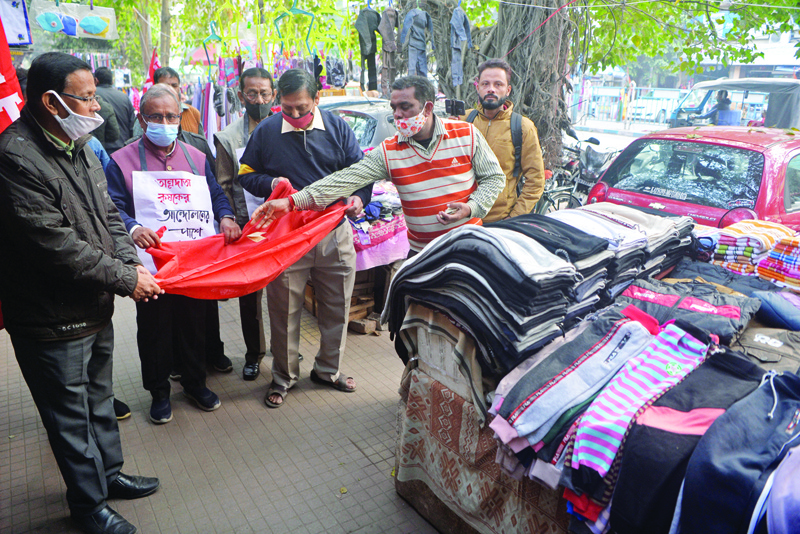
NEW DELHI: With foot-massage machines, a dental surgery, their own newspaper and even a tattoo parlor, it's clear that the thousands of Indian farmers blocking roads into Delhi for almost a month are going nowhere. The farmers marched on the capital in late November to protest at new farm laws they fear will destroy their livelihoods, but police firing tear gas and water cannon stopped them in their tracks.
So now, numbering tens of thousands, they are digging in at several entry points into the city, braving the bitter night-time cold with tents, blankets and fires, as well as hot samosas and sweet chai. With music blaring from large speakers fitted to tractors, the largest such site at the Singhu border crossing north of Delhi now resembles a lively-and highly organized-festival. Sunny Ahluwalia, a dentist, drove his van fitted with two dental chairs and an X-ray machine, all powered by a generator, from his home 250 kilometers away to help.
"We may have become doctors but we are sons of farmers," Ahluwalia said after scraping one farmer's yellowing teeth, one of around 100 patients he treats for free per day. "It is very unfortunate that our government isn't ready to accept the farmers' demands. How can the laws be good if they don't like them?"
Tired feet
The main camp snakes back almost a kilometer (half a mile). Tractor trailers are stuffed with bedding, while tents are set up around makeshift stalls offering anything from toothpaste to free medicine. The makeshift settlement is a hive of activity throughout the day, as the farmers-mostly without COVID masks-weave in and out of the bustling area, chatting and getting free food from community kitchens.
In one tent, volunteers have set up two neat rows of about 20 foot-massage machines to put a fresh spring in the step of the many grey-bearded, multi-colour-turbaned farmers. "Since many of the protesters are elderly farmers, they used to ask us for massages because of pain in (their) knees and feet," volunteer Bhupinder Singh said. "We felt that we could serve more people and do it better by purchasing these cheap machines." "I told them how it feels good and they are doing a very good job," said satisfied customer Harbans Singh.
Spick and span
A team of 50 volunteers wielding brooms and dustpans have split themselves into two teams to keep the bustling place clean. "While everything else is in good supply, we felt that we could clean it better since we may be here for long," Sukhwinder Singh said. The government has said the new laws will mean farmers do not just have to sell their produce at state-run bodies that guarantee a minimum price.
But the protesters, who are mostly from northern states, fear that with the minimum price taken away, they will be squeezed dry by large corporations. To spread their message across India and abroad-there have been solidarity demos in Canada and Britain-a common social media platform is managed by a 36-member IT cell.
The farmers have reportedly also set up their own weekly free newspaper to be distributed at the protest site. Any farmers wanting to make a lasting impression can also get tattoos of protest slogans, ploughs pulled by bullocks, or ferocious lions.
"This is our way of supporting the farmers. We have designs related to the Punjabi culture," Chetan Sood, one of the tattoo artists, told the Times of India. When night falls and the temperature plunges, many of the protesters end their long days inside tractor trolleys with six to eight other men sleeping on cotton bedding. "We dim the lights and sleep cosy. The young boys sleep outside (in the open) with blankets," farmer Kashmir Singh said. - AFP










